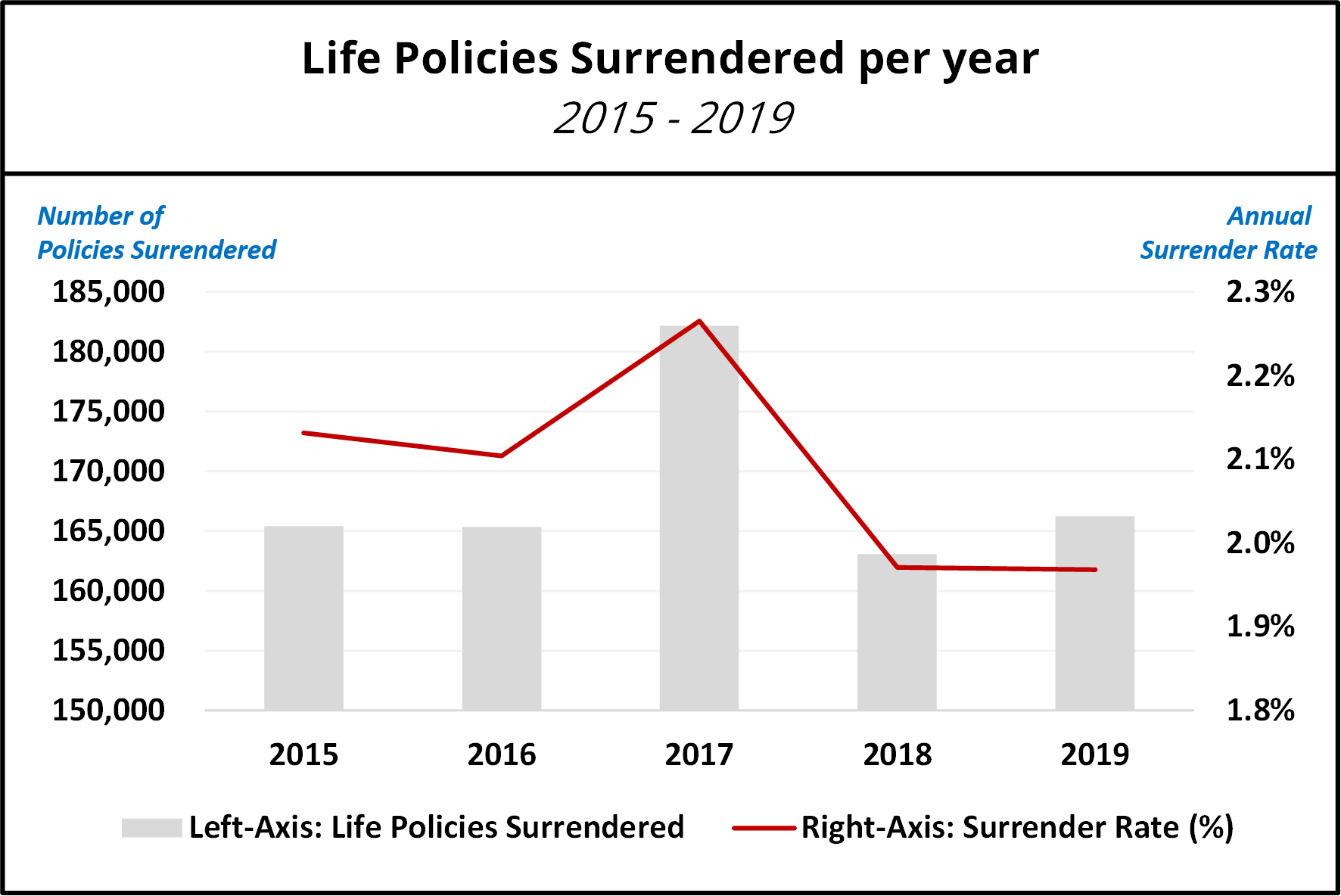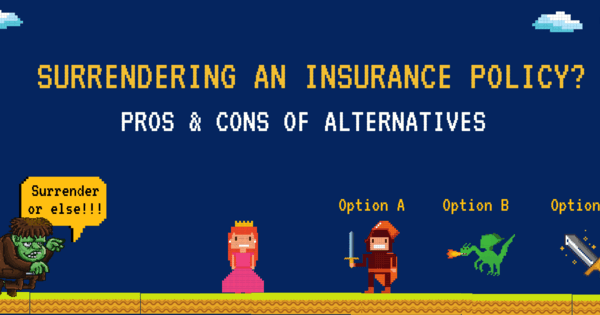Advertisement
OPINIONS
Surrendering an Insurance Policy? Pros & Cons of Your Alternatives
Aside from surrendering an insurance policy, there are alternatives a policy owner can take to achieve a better outcome
This article originated from The InvestQuest.
For real-time updates, do join their:
Telegram Group: The InvestQuest
Whatsapp Broadcast: Just send “Hello IQ” to 8840 2520
Summary
Types of Life Insurance Policies
When would it make sense to Terminate a life policy?
Alternatives to Surrendering a life policy
Pros & Cons of Selling vs Surrendering a policy
The InvestQuest View:
Buying an Endowment or Whole Life policy is a long-term commitment. While we generally encourage policy owners to service such policies to its intended maturity, there are instances where policy owners might want to surrender such policies.
Other than a policy surrender, we highlight the alternatives a policy owner can take, which may potentially lead to a better outcome.
1) Types of Life Insurance Policies
What’s a Life Insurance Policy?
Life insurance offers protection against the financial loss that can happen after one’s death or if one has suffered a total and permanent disability. Some life policies may even provide retirement income and cover certain health-care costs.
Types of Life Insurance Policies
There are several types of life insurance policies but the three most common types that we often come across are:
Whole Life Policies
Endowment Policies
Term Life Policies
At the end of 2019, there were over 8.4 million Whole Life, Endowment and Term Life policies in Singapore. The number of these policies in force in Singapore, at the year-ends of 2015 to 2019 is shown in the chart below. No surprise that the numbers have been rising annually, as more Singaporeans learn about the importance of financial planning and protection.

Source: Monetary Authority of Singapore, retrieved from https://www.mas.gov.sg/statistics/insurance-statistics/annual-statistics
The above-mentioned life insurance policies protect against mortality but it is also possible for life insurance policies to protect against longevity (where you run the risk of outliving your retirement savings). For Singaporeans, we are automatically enrolled into CPF Life, a life insurance annuity product that pays out a monthly income regardless of what age we live to.
For more information on Life Insurance, be sure to read the consumer guide published by the Life Insurance Association Singapore and Moneysense (click here to access the guide).
2) When would it make sense to Terminate a life policy?
Life Policies are a long-term commitment
Buying an Endowment or Whole Life policy is a long-term commitment. Where possible, we encourage policy owners to continue servicing their policies to its intended maturity.
That said, there are legitimate reasons to discontinue a policy.
Reasons why you might want to discontinue an endowment or whole life policy
Cash is required urgently
Insurance premiums are too burdensome
You have duplicate insurance coverage or have over insured yourself
Desire to pay off existing loans that are charging a high interest rate
There are better investment opportunities (some savvy policy owners had cashed out of their policies earlier this year, as they believed that investing directly in stocks would offer a better return)
Unforeseen events such as divorce, where there is a need to divide assets
You had purchased a policy for your child, who is now an adult now and is not keen to continue servicing the policy
Relocating to a different country and keen to bring all assets abroad
The tendency is to surrender the policy back to the insurer…
When faced with the above scenarios, the immediate reaction for many policy owners is to surrender the policy back to the insurer, without considering the available alternatives.
Surrendering a policy tends to be sub-optimal for the policy owner. In many cases, the surrender value offered by the insurer for Endowment and Whole Life policies is relatively unattractive.
In 2019 alone, over 166k life insurance policies were surrendered in Singapore (see chart below), reflecting an annual surrender rate of approximately 2%. Note that we have only factored in Whole Life, Endowment and Term Life policies, which are the most common types of life policies.

Source: Monetary Authority of Singapore, retrieved from https://www.mas.gov.sg/statistics/insurance-statistics/annual-statistics
But there are better alternatives to surrendering your policy
Some concerns may be solved without the need to surrender a policy. If we take a step back to identify the key issue faced by the policy owner (for example, a desire to reduce annual premiums OR desire to raise cash in the short-term), there may be ways to solve for these needs without the policy owner having to discontinue or surrender the policy.
For policy owners who are set on surrendering their policy, they may be able to extract more cash by selling the policy to a third parties. Endowment Exchange offers to buy over endowment and whole life policies at prices higher than the surrender value.
In the next section, we list the legal alternatives to surrendering a policy: 1) Selling the policy to a third party, 2) Take a policy loan, 3) Opt for Cash Benefit Feature, 4) Convert Whole Life to Paid Up Policy
3) Alternatives to surrendering a life policy
Beyond surrendering a policy, there may be other options that a policyowner can consider.
Sell the policy to a third-party: There are resale brokers and investors who may be able to offer a higher price than the policy’s surrender value, as they have the intention to continuing servicing the policy as an investment (more details in the next section).
Take a policy loan: The interest rate charged on policy loans is not cheap and typically around 6% p.a., but it may be an appropriate tool to meet short-term liquidity needs or to pay off other outstanding loans that charge even higher interest rates (such as credit card debt).
Opt-in for a policy’s cash benefit feature or withdraw accumulated cash value: Some endowment policies such as the Great Eastern Annual Cashback Endowment (ACE), Prudential’s PruFlexiCash and NTUC Renosave provide the policy owner with an option to receive a cash benefit at periodic intervals (similar to a bond coupon). The policyowner may leave this cash benefit to accumulate more interest in the policy and can be withdrawn at a later date if needed. Opting to receive the cash benefit may help to defray the annual premiums, if cash flow is tight.
Convert a Whole Life policy to a paid-up policy: A paid-up policy does not require the policyowner to pay any more premiums. The downside is that the death benefit will be of a reduced amount.
If your mind is set on discontinuing a policy, DO NOT simply surrender it to the insurer without considering your next best option: Selling your policy
4) Pros & Cons of Selling vs Surrendering a Policy
What does it mean to sell a policy?
Some types of insurance policies are eligible for “sale” to third parties. These typically include Endowment, Whole Life and Annuity Policies. We have used the word “sell” loosely here, but the actual process is called an “absolute assignment” of the policy. We explain what this entails.
Each life insurance policy will have a “policy owner” and a “life assured”, both of which can be the same or different people.
The “policy owner” is liable to service the insurance premiums and will receive the maturity pay outs or insurance claims.
The “life assured” is the person whom the life insurance plan covers. For example, a death pay out is paid on the demise of the “life assured”.
During an absolute assignment, only the “policy owner” is switched to a different person. The new “policy owner” will be liable to pay upcoming premiums and will be the recipient of any pay outs made by the insurer in future, such as during the policy’s maturity or a death benefit pay out. During the policy assignment, there is no change to the “life assured”.
Benefits of Selling vs Surrendering a policy
Selling a policy to a third party may allow the policy owner to get a higher price than the policy’s current surrender value. However, for policy owners in need of cash immediately, the downside is that some resale brokers may require a day or two to revert with an offer price.
If you have a policy that you’ve decided to sell, do consider our sister website Endowment Exchange. Endowment Exchange buys over existing endowment policies at prices higher than their surrender value, giving you more cash than if you were to surrender your policy to your insurer.
Click here to get a non-obligatory quotation on your life policy.

Comments
4286
0
ABOUT ME
Level up your investment knowledge with us!
4286
0
Advertisement
No comments yet.
Be the first to share your thoughts!
